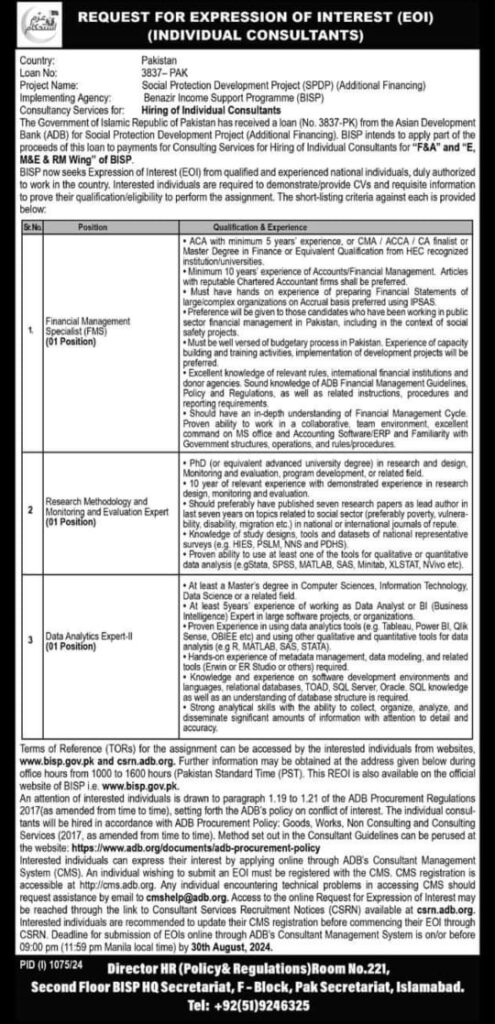Opportunity in Benazir Income Support Program (BISP)
Opportunity in Benazir Income Support Program (BISP)
The Benazir Income Support Program (BISP) is one of Pakistan’s most significant social safety initiatives, aimed at reducing poverty and promoting social equity by providing financial assistance to the country’s most vulnerable populations. Established in 2008, BISP has grown to become a lifeline for millions of families across Pakistan. This article explores the opportunities provided by BISP, its impact on the lives of beneficiaries, and the future prospects of this vital program.
Understanding BISP: An Overview
The Benazir Income Support Program was launched with the primary objective of cushioning the financial hardships faced by low-income families in Pakistan. The program provides unconditional cash transfers to eligible families, ensuring they can meet their basic needs. Over the years, BISP has expanded to include several other components, such as conditional cash transfers, vocational training, and health and education services.
Eligibility Criteria
Eligibility for BISP is determined through a poverty scorecard, which assesses the economic conditions of families across the country. This scorecard considers factors like income, household size, and living conditions. Families that fall below a certain threshold are considered eligible for financial assistance. BISP targets women, particularly female heads of households, recognizing the vital role they play in managing household resources.
Unconditional Cash Transfers
The cornerstone of BISP is its unconditional cash transfer program. Eligible families receive a fixed amount of money every quarter, directly deposited into the beneficiary’s bank account or disbursed through mobile banking services. This financial assistance helps families cover essential expenses, such as food, clothing, and healthcare, thereby alleviating the immediate pressures of poverty.
Waseela-e-Taleem: Encouraging Education
BISP’s Waseela-e-Taleem initiative is a conditional cash transfer program designed to promote education among children from low-income families. Families receiving BISP assistance are encouraged to enroll their children in school and ensure regular attendance. In return, they receive additional financial support. This initiative not only helps to increase school enrollment but also aims to break the cycle of poverty by empowering the next generation with education.
Vocational Training and Skill Development
Recognizing the importance of economic self-sufficiency, BISP also offers vocational training and skill development programs under the Waseela-e-Rozgar initiative. These programs are tailored to the needs of local communities and include training in trades such as tailoring, carpentry, and IT skills. Beneficiaries who complete these programs are better equipped to find employment or start their own businesses, leading to a more sustainable income source.
BISP’s Impact on Poverty Alleviation
Since its inception, BISP has had a profound impact on poverty reduction in Pakistan. According to various studies, the program has significantly improved the living conditions of beneficiaries by providing a steady income source. The unconditional cash transfers have empowered women, enabling them to take on a more active role in household decision-making. Additionally, the program has contributed to an increase in school enrollment rates and has provided opportunities for economic empowerment through skill development initiatives.
Challenges and Criticisms
Despite its successes, BISP has faced several challenges and criticisms. Some of the most common criticisms include the potential for mismanagement of funds, corruption, and inefficiency in targeting the most vulnerable populations. There have also been concerns about the sustainability of the program, particularly in the face of economic challenges and budget constraints. Furthermore, the dependency created by unconditional cash transfers has led some to question whether the program is fostering long-term self-sufficiency among beneficiaries.
The Future of BISP: Expanding Opportunities
The future of BISP lies in its ability to adapt and expand to meet the evolving needs of Pakistan’s population. There is a growing emphasis on integrating technology and data analytics to improve the efficiency and transparency of the program. The use of biometric verification and digital payment systems has already begun to reduce the risks of fraud and ensure that funds reach the intended recipients.
Furthermore, expanding the scope of vocational training and linking it more closely with the job market can enhance the program’s impact on economic empowerment. BISP is also exploring partnerships with the private sector and non-governmental organizations to broaden its reach and impact.
Conclusion
The Benazir Income Support Program remains a critical tool in the fight against poverty in Pakistan. While it faces challenges, its success in providing immediate relief and long-term opportunities for millions of families cannot be overstated. As BISP continues to evolve, it holds the potential to lift even more families out of poverty, contributing to a more equitable and prosperous society.

Join Us On https://jobsgoro.com/
Join Our Whatsapp Group (Jobsgoro.com).
https://chat.whatsapp.com/CVwROiD9kKSFwq6pnIdQxi
Join Us On Facebook :
https://www.facebook.com/profile.php?id=100085051735597&mibextid=ZbWKwL